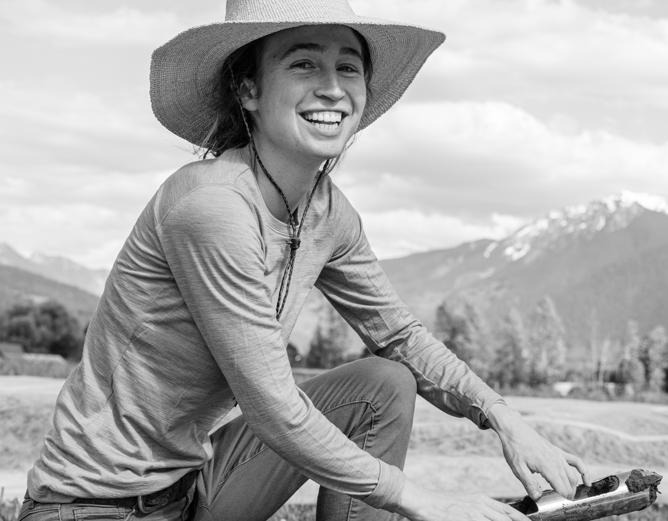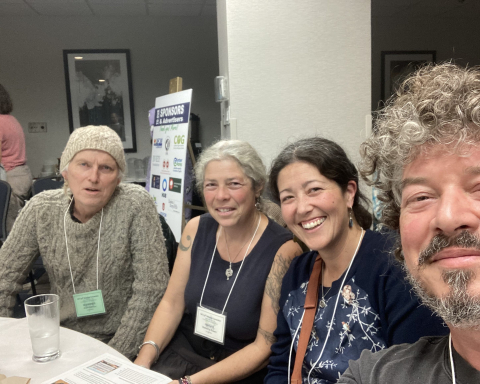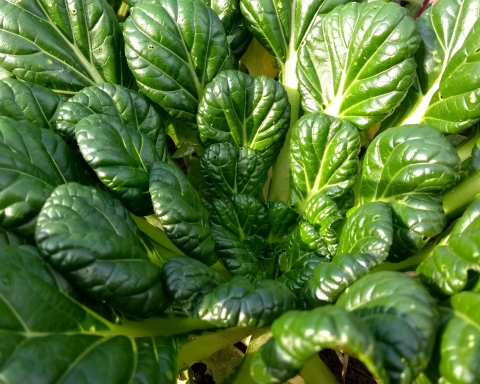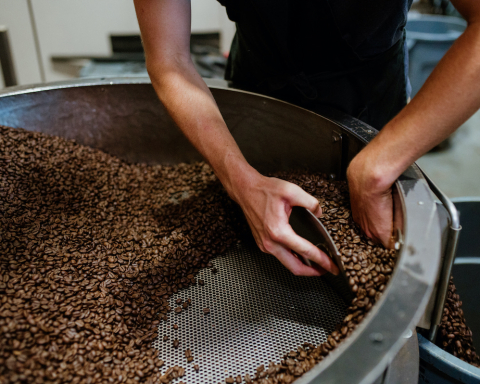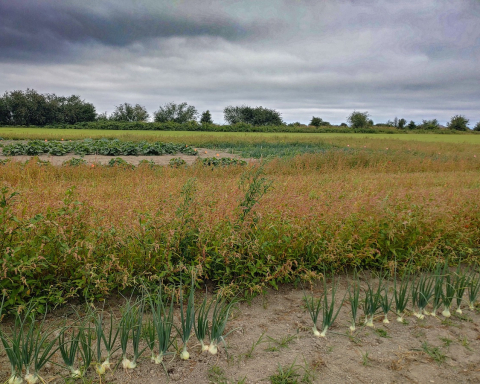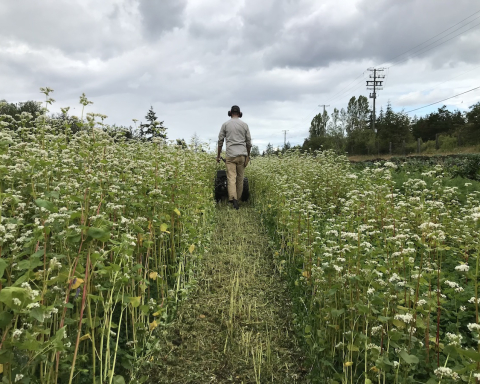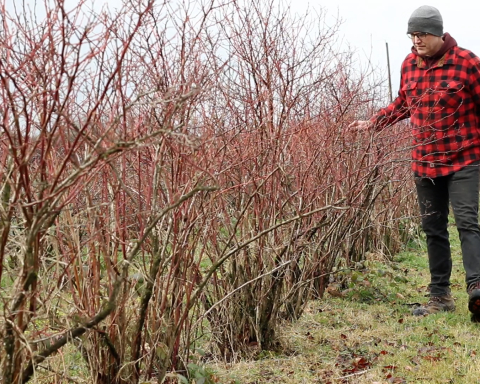Emma Holmes
As BC’s organic industry specialist, I have been able to meet many members of our organic community across the province. I also get to collaborate with other experts at the Ministry of Agriculture, and am keen to highlight them and the important work they do, so you can get to know them—and hopefully collaborate with them too! This issue, I interviewed Amy Norgaard, the Ministry’s Climate Change Extension Specialist.
Emma Holmes (EH): Hey Amy, I’m excited to be talking to you today! Let’s kick things off. When did you join the ministry and what is your role?
Amy Norgaard (AN): Thanks for having me. I love sharing about my work. I joined the ministry two years ago and my role is climate change extension specialist.
EH: You studied at UBC’s Faculty of Land and Food Systems. What were your favourite classes from your time there?
AN: Yes, I was at UBC for quite a few years. My bachelor’s is in agroecology and my master’s degree is in soil science with a focus on nutrient management on organic vegetable farms. In terms of my favorite classes, it’s hard to choose one!
When I think about my time at UBC, I mostly think about the experiential learning approach, where I was working with either community partners or on a research project or on problem-based case studies that have been created for active learning. But I think there’s two classes that I’d probably choose as my favourites.
My very first soil science class, Soils 200, was life changing. Maybe that is an overstatement, but at that point in time I was still trying to figure out what I was doing and why I was studying agriculture. Taking that soil science class changed my trajectory and definitely is why I am here now, as a soil scientist so many years later. I just felt like that class explained so much about how the world works.
EH: The class was life changing for me too. It got me excited about soil science and put me on my current career path.
AN: Yeah, it was a pivotal class for so many people. It really was.
The other class was a directed studies during my undergrad, which basically meant I chose a topic of study and I created my own learning goals. I didn’t actually have a course to attend. Instead, I spent half of my time at the UBC farm looking after the chickens and collecting and washing eggs and getting them ready for sale. And moving the chickens and rotating them through both their paddock and then following the vegetable rotation. And the other half of my time was doing a literature review about the benefits of rotational integration of poultry into vegetable production systems, in terms of economics, animal welfare, and impacts to soil properties like nutrient cycling.
And as part of that, I did interviews with producers who were rotating poultry in their vegetable fields. I’m grateful that producers shared their time and knowledge with me. I was just a young undergraduate looking to talk to some farmers about their experiences and challenges and I remember after those interviews I sent each of them a handwritten thank you card with 20 bucks of my own cash in it. Because of course, I didn’t have a stipend from the university. It wasn’t much but I’m always appreciative of people who are willing to share their time and knowledge.
EH: That was thoughtful of you. And then you did your masters and worked quite closely with several organic farms. Tell me more about that.
AN: So my master’s project started in 2018 and I worked with 20 producers across three different regions: Pemberton Valley, Vancouver Island, and the Fraser Valley. I did two years managing on-farm trials of three different nutrient management strategies. Jordan Marr interviewed me on the Organic BC podcast so people who are interested in more details about the project should check that out.
Throughout my research I really got to know the producers well. I visited their farms about four times a year for two years. I used to make this joke “the only person who’s busier than a farmer in the spring is the researcher who’s trying to chase 20 farmers to align with when they’re applying nutrients and when they’re plowing and planting.”
This project just deepened my respect for how knowledgeable and creative farmers are. They’re always doing their own research and testing out new changes, even if they don’t call it research. It really reinforced that support for food producers is not a top-down process. It’s not that knowledge is held in institutions, like universities or government, and that we need to come in and share information. It’s about sharing between producers, academics, and agrologists. Everybody has a different piece of the puzzle and our role, as a researcher or an agrologist, is to create tools or resources or ways to think about things that help producers do their work. That could be an online tool or researching a new practice that a producer is interested in, or a wildfire preparedness planning guide. It is any or all of those pieces. Producers already have so much of this knowledge and capacity, and it’s just helping them put all the pieces together or give them a missing piece. Or maybe setting up farmer-to-farmer gathering opportunities so they can glean those important lessons learnt from each other.
EH: Ministry agrologists have diverse roles, and your title, climate change agrologist could be interpreted quite broadly. Can you speak a bit to some of your current projects?
AN: Yeah, of course. I would say given the fact that my area of work is “climate change,” which in itself is quite broad, I definitely have a variety of projects. My projects right now range from program reporting, greenhouse gas emissions research, farm and ranch wildfire resiliency planning, and we’re also just starting a knowledge translation project to help move research from the hands of academics or researchers into the hands of producers, in a way that works better for producers.
That last one is a smaller project, but I think it has the ability to kind of scale up over time and be really impactful in the long term. We’re creating a process for research briefs that researchers at universities and other extension agrologists can use to succinctly and effectively translate their research in a standardized way and in language that makes sense to that target audience. The goal is to make agricultural research more accessible and useful to producers.
I laugh when I think about the extension products I created when I was finishing my masters. I think this templated process would have helped me to translate my research more effectively, and will help future researchers going forward.
And of course, linking those briefs to any podcasts, videos, or other relevant resources.
EH: What makes you excited about your work?
AN: My goal, or what would make me so happy, is a situation where I’m at a conference or at a field day, and I overhear producers talking about a tool or resource I’ve developed, and they’re saying how it’s made their day-to-day a little bit easier or has had a positive impact on their operation in some way. It’s not that I need the credit for it, I just want to feel like all these hours I spend at work might actually be making a difference!
Emma Holmes is the Organics Industry Specialist with the BC Ministry of Agriculture and Food. She studied Sustainable Agriculture and Soil Science at UBC, and then farmed on Salt Spring and worked on a permaculture homestead on Orcas Island. She now lives in Vernon and loves spending time in the garden. She can be reached at: Emma.Holmes@ gov.bc.ca
Featured image: Amy Norgaard in the field. Credit: Garnett Grove


